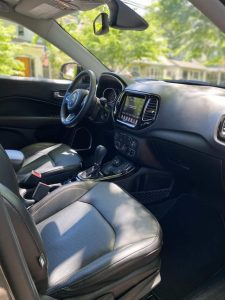 Written by:
Written by:

The Spacer Technologies content team is a dedicated group of writers and experts with a deep-rooted passion for the sharing economy. Our team is committed to creating informative, engaging, and valuable content across our various platforms. With a keen eye for detail and a talent for simplifying complex topics, we strive to empower our audience with knowledge and insights about the benefits of shared spaces.
Reading time : 8 mins

Cleaning car seats is not an easy task. It can be uncomfortable, time-consuming, and let’s face it, who really knows how to clean car seats the right way? Sure, you can get them professionally cleaned. But it’s not exactly cost effective to have your car seats serviced as frequently as they need.
The best approach: become your own car seat cleaning expert with this Parkhound car seat cleaning guide.
No matter if you’re cleaning up spills, fighting pet hair, or just trying to keep your car looking and smelling brand new. These cleaning hacks can help you get a professional clean at home. With faster and more efficient cleaning methods, you’ll never have to worry about your car being passenger-ready again!
In this guide, we’ll get into the ideal cleaning techniques for different car seat materials. But it’s a good idea to stock up on the cleaning tools and solutions you’ll need before getting started. Remember that if your car does have leather seats, you will probably be cleaning some carpeted areas as well, so make sure to have both sets of cleaning equipment.
A vacuum with a hose attachment is a great way to get the crumbs and dirt that is hiding in the crevices of your car seat. But, we also understand that lugging a vacuum to your car and finding a way to plug it in every time you want to clean the seats is not ideal. If you don’t have easy access to a vacuum, the next tool will do just as well.
A bristled brush can do an excellent job of preparing your car seats for your cleaning session. We actually prefer this cleaning tool to a vacuum because it’s much more accessible for frequent cleanings. When cleaning leather car seats, opt for a soft bristled brush that won’t scratch or damage the material. You can even find specialised leather brushes that are gentle enough to use on your leather shoes, purses, and, of course, leather car seats. For cloth seats, you’ll want a more firm bristled brush that won’t just sweep over the top of the material without picking up debris.
Yes, cleaning gloves are a great way to keep your hands safe from harsh chemicals, but we’re adding them to the cleaning kit for a different reason. As it turns out, wet cleaning gloves are an unbelievably easy way to pick up pet fur while cleaning car seats.
You might be tempted to use the same sized bucket that you use for cleaning your car’s exterior, but here’s the advantage of using a smaller vessel: you can set it inside the car for easier access. Whatever you use, make sure that it’s sturdy enough not to topple over while you’re cleaning.
This, of course, will be useful in applying your cleaning solution and working out tough stains. The material isn’t a huge factor, although we suggest something with good texture so that you can build up some traction on cloth car seats. For leather car seats, microfiber is ideal.
Now, here’s where you can really personalise your car seat cleaning kit. DIY solutions work great here, but you can also rely on specialised car seat cleaners. We’re going to dive into the different kinds of cleaning solutions in the next section!
There are pros and cons of DIY cleaning products and store-bought cleaning supplies. The former is a good option for anyone looking for a more economical product with all-natural ingredients.
The latter can offer specialised products that have been tested and proved to be effective. Ultimately, you can decide which is best for you. If you’re on the fence, we would recommend starting out with DIY cleaning supplies – after all, you can find many of the ingredients right in your kitchen cabinet – and then switching to store-bought products if you’re not happy with the results.
Here’s a guide to making your own car seat cleaning product:
A mixture of white distilled vinegar and olive or linseed oil will work wonders for most types of leather seats. You can make the solution with two parts of vinegar to every one part of oil. Some leather repair experts also suggest adding in a couple drops of lemon juice. Make sure to test a tiny bit of the solution on a hidden part of your leather seats before cleaning the entire car interior. If there’s no colour change, you can proceed with your DIY cleaning product. Whatever you do, protect your leather car seats by avoiding alkaline household products. Things like bleach, ammonia, soap, sodium hydroxide, and detergents.
Carpeted materials are less sensitive than leather, so there are even more DIY options you can try. A mixture of 2 tablespoons dish soap, 2 tablespoons washing soda, your choice of essential oils and 2 cups hot water will take out the toughest of stains when cleaning cloth car seats. Alternatively, you can stick to a tablespoon of your favourite laundry detergent, dissolved in a cup of hot water. For an even more all-natural option, you can swap out detergents and soaps for castile soap. This option is vegetable-based and perfect for your cloth car seats.
You have the range of tools and products you need to clean your car seats, so now it’s time to actually get to work! Here are a few tricks and tips to make your cleaning session efficient:
1.Clean off debris from top to bottom. If you’re using a brush, start brushing off your car seat from the headrest down, eventually collecting all crumbs and dirt in a dust pan or other receptacle.
2, Remove any fur or hair with your cleaning glove.
3. Apply the cleaning product. You don’t want to spray or pour cleaning products directly onto your car seat. Instead, dab a part of your towel into the solution and then apply to the seat in a circular motion. With leather car seats, you never want the seats to be too wet.
4. Keep the doors of your car open to allow any residual moisture to evaporate.
5. Repeat as necessary
Maintaining a clean car interior is easy as long as you pick up some good habits. Here are some final tips on keeping your car seats clean:
Once you get into the routine of caring for your car seats, you and all of your passengers will notice the difference. Reach out to us at Parkhound with your tips for cleaning car seats or any of your car maintenance questions!

The Spacer Technologies content team is a dedicated group of writers and experts with a deep-rooted passion for the sharing economy.
Our team is committed to creating informative, engaging, and valuable content across our various platforms.
With a keen eye for detail and a talent for simplifying complex topics, we strive to empower our audience with knowledge and insights about the benefits of shared spaces.

The Spacer Technologies content team is a dedicated group of writers and experts with a deep-rooted passion for the sharing economy.
Our team is committed to creating informative, engaging, and valuable content across our various platforms.
With a keen eye for detail and a talent for simplifying complex topics, we strive to empower our audience with knowledge and insights about the benefits of shared spaces.
Demo Description
This will close in 0 seconds
This will close in 0 seconds